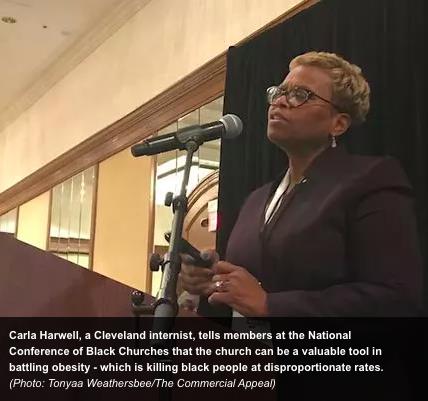Memphis has scores of African-American churches, where members are referred to as the body of Christ. But too many African-American congregants aren’t taking care of their own bodies – which is one reason why Memphis is the second fattest city in the nation.
And if that doesn’t change, fewer black people will be around to turn around all the other problems plaguing their communities. “We are dying,” Carla Harwell, a Cleveland internist told a recent gathering of the Conference of National Black Churches in Memphis, which is focused on helping African-Americans overcome biases in health care, economics and other areas that impact their lives. “We die of diseases at rates higher than our Caucasian counterparts.”
“The quality of care that we get is not equal or equitable…black folks are dying…”African-American women, for one, are 40 percent more likely to be obese, 60 percent more likely to be diabetic, 30 percent more likely to die of heart disease than their white counterparts. On top of that, 55 percent of black women between the ages of 50 and 84 have knee problems, are overweight or both, she said.
One thing that has fed that disparity, besides too much fast food and being sedentary, Harwell said, is how doctors are reimbursed for Medicare.
They get paid to “fix complications,” she said, which means they can order excessive tests and procedures without being held to any financial responsibility to improve quality of care - meaning that it’s easier to recommend knee surgery for an obese patient than to encourage them to lose weight.
But that’s all about to change, Harwell said. Fixed amounts will be paid out for Medicare, so patients will now have to do more to avoid conditions, many of which are obesity-related, that will require knee surgery and expensive treatments – because any treatments outside of that fixed budget will not be covered.
The problem is that now, obesity has disabled so many poor people, and poor African-American women, to the point where it is a struggle for them to exercise.
That’s what needs a fix. And, Harwell said, that’s where churches can make a difference. She’s right – especially when it comes to helping black women. Six in 10 African-American women attend church services each week – which means they show a higher commitment to religious services than any other group. The church is the place where they can get food to lift their spirits, and food to lift their health.
Harwell had some suggestions. Churches, she said, can promote praise dancing. They can organize exercise classes and walking groups. They can also encourage congregants to have a healthy relationship with their primary care doctors.
“I believe there’s power in the pulpit,” Harwell said. “We need to break that vicious cycle. Movement doesn’t mean I have to join the gym…I can go to an indoor mall and walk around. How about starting some walking clubs? How about some baked-only potlucks…”?
I can add a few.
Churches can also promote farmers’ markets in poor neighborhoods, or even set them up in their churches. And they can also urge congregants to become involved with Movement is Life – an initiative that helps people avoid health problems that can make it tough for them to move around, and keep them mired in the belief that surgery is the solution to problems that can be avoided through changing habits.
“I believe the churches can be the center for cultural change in our communities,” Harwell said. “My sisters out there, some of us take better care of our hair and nails than we do our bodies…
“Use the church as a center for health care reform. Remind everyone that movement is life.” movementislifejourney.com
Tonyaa Weathersbee, USA TODAY NETWORK
